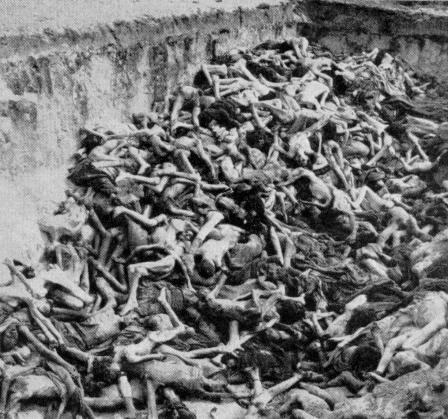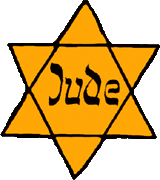May 1, 2008, - 2:48 am
On Holocaust Remembrance Day: “My Father, Of Blessed Memory”
By Mayer Busak/ Translated from Hebrew by H.L. Schlussel, MD, Z”L
[Note From Debbie: Today is Holocaust Remembrance Day. This article, “My Father, Of Blessed Memory,” originally written in Hebrew by Holocaust survivor Mayer Busak in Israeli newspaper HaZofe in 1991, was translated into English by my own father, of blessed memory, H.L. Schlussel, MD. With the permission of Mr. Busak, my father translated this very moving, sad article about the days in the camps and submitted it for publication to a few different Jewish magazines. He was, sadly, rejected. After my father passed away in September, I was cleaning out his office and found the article, along with a 1991 rejection letter from Commentary Magazine. Silly them.
Although my father was a religious man and Torah scholar, he recognized–and lamented–that the horrors of the Holocaust caused some to lose their faith (though many others survived because of their faith). My father wanted more than anything for the world to read this article, as did its author, Mr. Busak. And I know of no better way to both honor that wish and remember the millions of victims of the Nazis than to print this exclusive English language translation of the article, herein.]

My father, of blessed memory, owned a large metal tool store in the city of Krakow, in Poland. But every day, before he opened his store, he would go, in the early hours of the morning, his Tallis [Jewish prayer shawl] and Tfillin [leather Jewish prayer item] sack under his arm, for morning prayers at his house of study.
And when my father, of penetrating eyes, wrapped himself in his Tallis, his pale, Nazarite face wreathed in his black, brown beard beamed with joy at Dvekus [Jewish concept of clinging to G-d].
I will not dwell here on the great suffering and travail that came to my father during the time of the German conquest, about the loss of my brother and sisters, on my mother being sent off to a factory for the manufacture of chemical weapons. I just want to present a few episodes from my father’s last days in the Plashov concentration camp in which we were together.
My father worked in the metal shop in the camp and I in the carpentry shop. We lived in separate cabins. These were the type of large, wooden building that is always enveloped with darkness and mist. In every cabin, there lived about 500 men, that slept in four-tiered bunks made from boards. Between the rows of scaffolding supporting the bunks, there was a narrow passage way.
Every morning before I went out to formation that took place in the central square of the camp, in which the prisoners stood to be counted with their blocks, I would come to my father’s cabin to see how he was. I also did this in the evening after work. My father spoke little during the days of the war. From the time that my mother was sent off from the Plashov camp, he actually became mute. Then, one evening, I noticed that for the last few days, my father had been humming and singing a melody that I remembered from the old days, from that distant house of prayer. But the words of the melody were hidden from me, as if they had sunk into the depths of the dark mist. I asked him what this melody was. Instead of an answer, he just waved his hand.
One evening, when I was standing next to his bunk, somebody approached and told the following:
“This morning after the night shift came back from work, the SS man, Green, came into the cabin. He saw Shlomo [Solomon] Goldblatt standing wrapped in his Tallis next to his bed on the end of the row of bunks. The German drew his pistol, he took Goldblatt to a pit near the cabin and shot him . . . It’s anarchy . . .” finished the narrator. “I tell you, it is all anarchy.” When he finished, the person that had told us of the incident stood quietly in his place, as if waiting for my father’s response. But my father did not say a word.
The next morning when I came, as was usual, to my father’s bed, the cabin was still enveloped in mist and silence. My father stood next to his wooden bad wrapped in his Tallis and sang and hummed his melody. Suddenly, I remembered. This was the melody from the Yom Kippur prayer that tells about the angels singing praise and asking each other, “Who dwells on high?”
One day, to my astonishment, it was as if my father smashed his silence, and he said:
Among the salesmen from the factories that used to come to my office, at the store, there was one that would always bring up matters of religion in the conversation. During the last period before the war broke out, he would tell about the atrocities in the German concentration camps. In general, he would then add, “and you are a religious man, a believer. Tell me, if He [G-d] exists, why does He permit it. Why doesn’t He become involved?” . . . And there were arguments. Yes there was a world of arguments, he in his world and I in mine. . . Yes, it was a world of arguments . . .
And again, my father sank into the silence. Finally, I dared and I asked, “What are you thinking about?”
He answered, “The question of our first father [Abraham] gnaws at me . . .”
I did not know which question he meant.
This happened the night of the Seder of 1943. It was clear that for the Jews of the camp, this was just a date only for recalling memories. It was impossible even to dream about the Passover Seder feast. As usual, I approached the bunk of my father. And behold, from a bundle of old clothes that was sitting on the boards of the head of his “bed,” my father took out matzoh [unleavened cracker traditionally eaten on Passover in lieu of bread, which is forbidden during the holiday] wrapped in a white shirt, which he had washed in the wash cabin of the camp. He gave it to me and he said, “East and recite the blessing, ‘who has sanctified us with His commandments and commanded us to eat matzoh.'”

I was astonished. – Where did he get matzoh? Then I noticed that the one gold tooth that he had in his mouth was missing.
I asked, “What happened?”
I was afraid that one of the SS men had knocked his tooth out with a blow.
I pulled it out, I sold it. I had the opportunity to send some money with one of the gentiles, to mother. From the rest, I bought a little flour from the camp bakery. I baked a few matzohs on the range in the metal shop and divided them among a few people.
He did not taste the bread ration that was distributed to the Jews every day in camp. He traded them for a few pieces of potato, and he lived on them all the days of Passover. [DS: Jewish law prohibits eating bread on Passover.]
On the 15th of Iyar [month on the Jewish/Hebrew calendar], a “selection” took place among the prisoners of the camp. In the central square of the camp, twenty thousand Jews were stood in their block – men, women, old people, and children. They were commanded to undress and to pass, one by one, by the tables that were set up in the corner of the square. Next to the tables stood the SS men. As each of the naked prisoners passed next to the tables, they stated their number. The SS man took out a card from one of the boxes that were sitting on the table, and cast a glance at the passing individual. With his pen, he made a mark on the card and returned it to the box.
In camp, there was talk that those who had been marked would be sent away soon.
A week after this, the prisoners of camp were called early one morning to formation in the central square. Nobody knew for sure what the reason for the formation was at such an early hour. Just about all of them took with them their bowl and plate in which they received their daily ration of thin soup. Who knew! Perhaps, they would be sent to another camp, and there they would need them. This time, the Jews did not have to undress. With an announcement of the names and numbers, people were separated from their blocks. About 2,000 men and women, young and old, were separated and marched in lines to the freight cars of the train that waited near the camp. That very day, the train arrived at the crematoria in Auschwitz.
The next day, my father’s “bed” was empty. Only the bundle of his few clothes were left in its place and next to it, his spoon and bowl. But the Tallis in which he wrapped himself every morning was not there. It appeared he had taken it with him.*
Suddenly, there flashed within me the question of Abraham:
“Can the Judge of the Whole World not do justice?”
[* Jewish males are buried in their Tallis (prayer shawl).]


Sorry Deb but I am tired of hearing about the Holocaust. For the most part 6 million sheep walked willingly into gas chambers without even trying to fight back. Where are the museums for the 20 million killed by Stalin? or the 60 million killed by Mao? Do not get me wrong I do NOT believe that Hitler was right, I am just tired of hearing about it. If it was any other peoples then it would be a footnote but because it was the “Jews” it is never ending.
Love your movie reviews though
Marty Fee
[MF: YOU ARE FULL OF CRAP. THE FACT IS, PLENTY OF JEWS RESISTED AND TRIED TO FIGHT THE NAZIS, INCLUDING MY GREAT-UNCLE WHO DIED FIGHTING THE NAZIS AS A PARTISAN IN THE RESISTANCE. THE BIELSKI BROTHERS MILITIA–A DANIEL CRAIG MOVIE ABOUT WHICH IS COMING OUT THIS YEAR–FOUGHT AND KILLED HUNDREDS OF NAZIS AND BLEW UP THEIR MUNITIONS. THERE WAS THE WARSAW GHETTO UPRISING. MANY JEWS WERE IN THE RESISTANCE AND THE UNDERGROUND. JEWS WERE NOT ALLOWED BY LAW TO OWN GUNS. YOU TRY DEFENDING YOURSELF THAT WAY WITH MACHINE GUNS POINTED AT YOUR HEAD. BUT FIRST, READ THE BOOK, “THEY FOUGHT BACK,” AND MANY OTHERS LIKE IT DEBUNKING THE MYTH YOU TRY TO REPEAT HERE. NAUSEATING. DS]
mfee01 on May 1, 2008 at 6:32 am